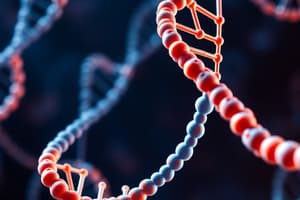Podcast
Questions and Answers
Which monosaccharide is a key source of energy and can also be polymerized to form cellulose?
Which monosaccharide is a key source of energy and can also be polymerized to form cellulose?
- Glucose (correct)
- Maltose
- Lactose
- Sucrose
What elements do all carbohydrates contain?
What elements do all carbohydrates contain?
- Carbon, hydrogen, nitrogen
- Carbon, hydrogen, oxygen (correct)
- Carbon, phosphorus, oxygen
- Carbon, nitrogen, oxygen
How do isomers of glucose differ?
How do isomers of glucose differ?
- They have different numbers of carbon atoms
- They have the same formula but different structural arrangements (correct)
- They have different functional groups
- They have different molecular weights
What is the general formula for a monosaccharide?
What is the general formula for a monosaccharide?
Which element is NOT found in all carbohydrates?
Which element is NOT found in all carbohydrates?
What type of bond is formed between two monosaccharides to create a disaccharide?
What type of bond is formed between two monosaccharides to create a disaccharide?
What structural difference distinguishes α glucose from β glucose?
What structural difference distinguishes α glucose from β glucose?
'Deoxyribose sugar' is commonly found in which biological macromolecule?
'Deoxyribose sugar' is commonly found in which biological macromolecule?
'Phosphodiester bond' is commonly associated with linking which molecules together?
'Phosphodiester bond' is commonly associated with linking which molecules together?
Why does benzene have a lower electron density than C=C?
Why does benzene have a lower electron density than C=C?
Why does bromine experience a weaker induced dipole in the presence of benzene compared to an alkene?
Why does bromine experience a weaker induced dipole in the presence of benzene compared to an alkene?
Why is methylbenzene less toxic than benzene?
Why is methylbenzene less toxic than benzene?
What is the key importance of the nitration of benzene?
What is the key importance of the nitration of benzene?
In the nitration of benzene, what acts as the electrophile?
In the nitration of benzene, what acts as the electrophile?
What are the reagents required for the nitration of benzene?
What are the reagents required for the nitration of benzene?
What functional group is added to benzene during nitration to form nitrobenzene?
What functional group is added to benzene during nitration to form nitrobenzene?
Why is the nitration of benzene considered an electrophilic substitution reaction?
Why is the nitration of benzene considered an electrophilic substitution reaction?
At what temperature is the nitration of benzene typically carried out?
At what temperature is the nitration of benzene typically carried out?
Flashcards are hidden until you start studying




